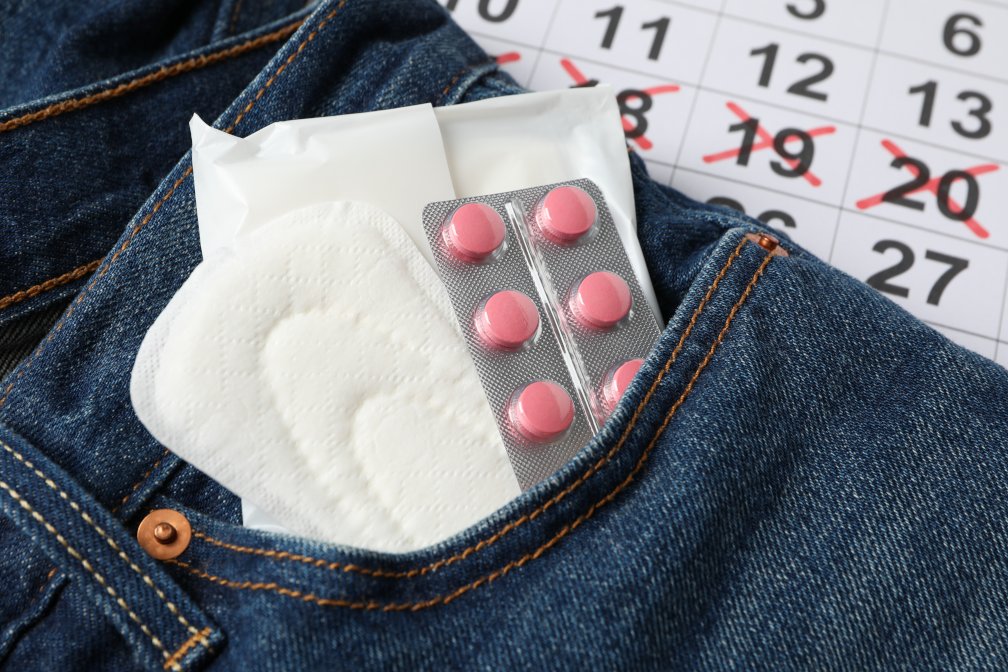
If you are asking “how to get your period back after over exercising”, and you’ve been exercising intensely and notice your menstrual cycle is off track, you’re not alone. Overexertion can lead to a condition called hypothalamic amenorrhea, where periods become irregular or cease altogether.
This article provides a comprehensive guide to regaining regular menstruation, covering everything from balanced nutrition to stress management strategies. Stay tuned for an enlightening journey towards restoring hormonal balance and reclaiming the rhythm of your body!
Key Takeaways
- Hypothalamic amenorrhea is a condition caused by excessive exercise, caloric restriction, and stress that can lead to irregular or absent periods.
- To get your period back after over – exercising, focus on eating a balanced diet with enough calories and nutrients.
- Moderating exercise levels, managing stress effectively, and considering the use of supplements or seed cycling can also help restore hormonal balance and regulate your menstrual cycle.
Understanding Hypothalamic Amenorrhea
Hypothalamic amenorrhea is a condition characterized by the absence of menstruation due to hormonal imbalances caused by factors such as excessive exercise, caloric restriction, and stress.
Definition and causes
Hypothalamic amenorrhea is a condition identified as the absence of menstrual periods due to an imbalance in the body’s hormones. This imbalance often arises from excessive physical activity, causing the brain’s hypothalamus to slow or stop releasing necessary hormones that trigger ovulation and menstruation.
Overtraining in sports or exercise can lead to this hormonal disruption, particularly when paired with inadequate caloric intake and elevated stress levels. Similarly, frequent restrictive dieting or food limitations may also disrupt hormone production and contribute to the onset of this condition.
Notably, high-stress environments without enough relaxation and recovery time can be another driving factor behind hypothalamic amenorrhea.
Physical and emotional consequences
Over-exercising and experiencing hypothalamic amenorrhea can have significant physical and emotional consequences. Physically, this condition can lead to the loss of your menstrual cycle, which is a warning sign that something is not right in your body.
It may also result in reduced bone density, making you more prone to fractures and injuries. Emotionally, the absence of your period can cause stress and anxiety as it is a visible reminder that your body is out of balance.
Additionally, it can impact your self-esteem and sense of femininity. It’s crucial to address these consequences by making changes in diet, exercise routine, stress management, and seeking professional guidance to regain hormonal balance and restore your menstrual function.
Common factors: exercise, caloric restriction, stress
Exercise, caloric restriction, and stress are common factors that can contribute to the loss of your period. Excessive exercise can disrupt hormonal balance and interfere with your menstrual cycle.
Caloric restriction, especially when combined with intense workouts, may not provide enough energy for your body’s needs and impact menstruation. Additionally, high levels of stress can affect hormone production and lead to irregular or missed periods.
It is important to address these factors and make necessary lifestyle changes in order to restore your menstrual cycle naturally.
Steps to Get Your Period Back
To regain your period after over exercising, it is essential to focus on eating a well-balanced diet, moderating exercise levels, managing stress effectively, and considering the use of supplements and seed cycling.
Eating a balanced diet
To get your period back after over-exercising, one crucial step is to focus on eating a balanced diet. Consuming enough calories is essential for supporting your body’s needs and restoring hormonal balance.
In addition to quantity, the timing and quality of your meals also play a role in menstrual cycle recovery. Regular meals throughout the day can help regulate hormones, while including a variety of nutrients from fruits, vegetables, whole grains, lean proteins, and healthy fats can aid in restoring your menstrual cycle.
Moderating exercise
Moderating exercise is a crucial step in getting your period back after over-exercising. While staying active is important for overall health, excessive exercise can disrupt hormonal balance and lead to amenorrhea.
To regain your menstrual cycle, it’s essential to find a balance that works for you. This means reducing the intensity and duration of your workouts, incorporating rest days into your routine, and listening to your body’s signals.
By giving yourself time to rest and recover, you allow your muscles to repair and prevent injuries while promoting hormonal equilibrium. Resting doesn’t mean stopping altogether – low-impact activities like walking or yoga can still be enjoyed during this time.
Managing stress
Managing stress is a crucial aspect of getting your period back after over-exercising. High levels of stress can disrupt hormone production and lead to irregular or missed periods.
Finding healthy ways to manage stress, such as practicing relaxation techniques like yoga or meditation, engaging in activities that bring joy and relaxation, and prioritizing self-care, can help restore hormonal balance and promote a regular menstrual cycle.
It’s important to address the underlying stressors in your life and make conscious efforts to reduce their impact on your overall well-being. Taking steps to manage stress will not only support the recovery of your menstrual cycle but also contribute to better overall health and happiness.
Utilizing supplements and seed cycling
Supplements can be beneficial in supporting your hormonal health and aiding in the recovery of your menstrual cycle. Consult with a healthcare professional to determine what supplements may work for you.
In addition, seed cycling is a natural remedy that involves consuming specific seeds during different phases of your menstrual cycle. It is believed to help regulate hormones and promote a regular menstrual cycle.
Including these strategies in your recovery plan can assist in restoring hormonal balance and getting your period back naturally.
Additional Factors to Consider
Weight changes, medications, post-pill readjustment, and PCOS are all important factors to consider when trying to get your period back after over exercising.
Effects of weight changes
Weight changes can have a significant impact on your menstrual health. Losing or gaining weight rapidly can disrupt your hormonal balance and lead to irregular or missed periods. In cases of excessive exercise, weight loss is often a common factor contributing to the loss of menstruation.
On the other hand, rapid weight gain can also affect your menstrual cycle by increasing estrogen levels in the body. It is important to maintain a stable and healthy weight to support regular menstrual function.
Consulting with a healthcare professional can help you determine the right approach for achieving and maintaining a balanced weight that promotes optimal hormonal balance and restores your period.
Medications
Certain medications can play a role in getting your period back after over-exercising. By working with a healthcare professional, they can determine if any medications may be beneficial for you based on your specific situation.
It’s important to keep in mind that medication should not be the only solution, but rather used in conjunction with other lifestyle changes like nutrition and exercise moderation. Remember to always consult with a healthcare provider before starting or stopping any medications as they can provide personalized guidance tailored to your needs.
Post-pill readjustment
Post-pill readjustment refers to the process of your body regaining its natural hormonal balance after discontinuing the use of birth control pills. It is important to understand that this adjustment period can vary for each individual, and it may take some time for your regular menstrual cycle to return.
During this time, it is crucial to focus on nourishing your body with a balanced diet, moderating exercise, managing stress, and considering supplements or seed cycling as mentioned earlier.
Remember that patience and consistency are key as you allow your body to naturally readjust and regain its normal menstrual function.
PCOS
PCOS, or polycystic ovary syndrome, is a condition that affects the hormonal balance in women. It can lead to irregular periods or even the absence of menstruation altogether. PCOS is often characterized by the presence of cysts on the ovaries and symptoms such as weight gain, acne, and hair growth.
While over-exercising itself may not directly cause PCOS, it can exacerbate symptoms for those who already have the condition. It’s important to understand that getting your period back after over-exercising with PCOS may require additional steps and considerations beyond what has been mentioned earlier.
Consulting with a healthcare provider who specializes in reproductive health can provide personalized guidance and strategies to manage PCOS effectively and regain menstrual regularity.
Conclusion
Take control of your menstrual health by following these steps to get your period back after over-exercising. With a balanced diet, moderate exercise, stress management, and the right supplements, you can restore hormonal balance and regain regular periods.
Don’t let exercise-induced amenorrhea hold you back – prioritize your well-being and promote a healthy menstrual cycle.
FAQs
1. What does it mean to recover from menstrual irregularities due to overexercising?
Recovering from menstrual irregularities means working towards regaining your regular periods and normalizing menstrual function after over-exercising.
2. Are there any natural ways to regain menstruation after excessive training?
Yes, strategies for menstrual cycle recovery involve a balance of rest, joyfully balanced exercise, injury prevention and proper nutrition.
3. How do I manage amenorrhea caused by intense fitness routines?
Managing amenorrhea induced by rigorous exercise involves recovering from the state of being overtrained, reestablishing menstruation through nutrition strategies and promoting healthy menstrual function.
4. Can restoring my workout routine provide relief if I’ve lost my period due to exertion?
Balancing your exercises with an appropriate amount of resting time can indeed help restore your menstrual cycle disrupted because of exhaustive workouts.
5. What should I be aware of while trying to overcome exercise-related menstrual irregularities?
It’s crucial to understand that overcoming exercise-induced amenorrhea isn’t just about muscle recovery; striving for regaining regularity in periods also includes fostering a mindful balance between physical exertion and preserving overall menstrual health.


